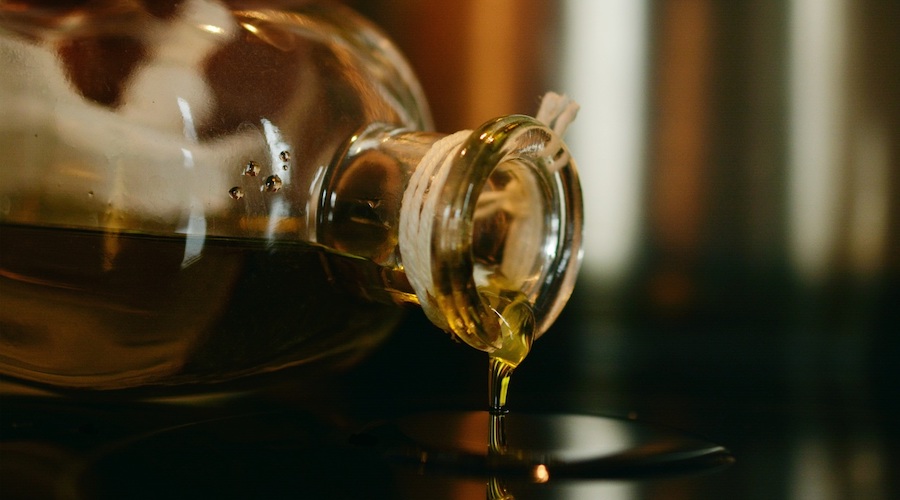Staff Writer | March 15, 2023 |

Vegetable oil. (Reference image from Pxhere).
Iran-based researchers have developed a novel and cost-effective anode catalyst that can improve and stabilize the power generation performance of microbial fuel cells (MFCs) treating vegetable oil industry wastewater.

In a paper published in the Journal of Chemical Technology and Biotechnology, the scientists explain that MFCs convert the chemical energy stored in organic matter in wastewater into electricity using bacteria as a catalyst. For years now, the team has been investigating how the modification of the electrodes can improve the performance of this technology.
“Electrode design is the greatest challenge in making MFCs a cost-effective and scalable technology. The anode of MFCs plays a vital role in the extracellular electron transfer between the electroactive bacteria and the solid electrode surface,” Hossein Jafari Mansoorian, corresponding author of the study, said in a media statement. “In this regard, it is of crucial importance to develop a novel anode material with synergistic effects between the properties of the anode surface and microorganisms.”
In Mansoorian’s view, a desirable anode should offer good conductivity to speed up the electron transfer rate; excellent biocompatibility and low bio-toxicity for microbes; higher specific surface area to provide more microbe attachment and catalytic activity sites; chemical stability and anti-corrosion resistance, and flexibility and durability, as well as low cost to commercial application.
“In order to improve bacterial adhesion and efficient electron transfer between bacteria and the electrode surface, the electrode should be modified and its surface area increased to ensure efficient current collection and power yield through the decomposition of organic compounds in the wastewater,” the researcher explained. “Based on the results of this study, the TiO2-HX@MWCNT-COOH-Al2O3 structure of this composite is a suitable candidate for modifying the anode electrode and greatly enhances electroactivity.”
Bamboo instead of platinum
Mansoorian and his group also investigated the modification of the cathode to identify a cost-effective alternative to platinum. Carbon felt modified with powdered activated carbon (PAC) originating from Bambuseae (a family of bamboo plants) was found to be effective.
According to the researcher, the findings from this study are the latest in continuing efforts to improve MFC performance. “A tremendous breakthrough has been made regarding power output in MFCs from a few mW⋅cm-2 or mW⋅cm-3 to several W⋅cm-2 or W⋅cm-3, an improvement of three orders of magnitude, owing to continuous efforts of researchers,” he noted. “The use of fossil fuels, especially oil and gas, in recent years has accelerated and this is triggering a global energy crisis. Renewable bioenergy is viewed as one of the ways to alleviate the current global warming crisis.”
For Mansoorian, the large volumes of wastewater generated by the vegetable oil industry mean that the high energy requirements of conventional wastewater treatment are unsustainable.
“Since traditional wastewater treatment has various limitations, sustainable implementations of MFCs might be a feasible option in wastewater treatment as well as green electricity production, bio-hydrogen synthesis, carbon sequestration, and environmentally sustainable sewage treatment,” the scientist pointed out. “But for MFCs to be a viable option for wastewater treatment, they need to be scaled up to accommodate large volumes of incoming wastewater, which has proven challenging for several reasons, including minimizing the distance between the anode and cathode to reduce electrical losses and being cost-competitive with other treatment technologies.”
In addition, Mansoorian noted that the materials used for MFCs are expensing, as they include membranes to separate the electrodes, which are prone to fouling, and a catalyst to produce enough power.
“At last, after obtaining superior anode electrodes, it is necessary to examine their long-term performance in real wastewater treatment to investigate their stability, durability, mechanical properties and secondary pollution effects,” he said. “Nonetheless, MFCs undoubtedly have potential in terms of energy recovery during wastewater treatment, occupying a market niche in terms of a stand-alone power source and also in the direct treatment of wastewater.”
No comments:
Post a Comment